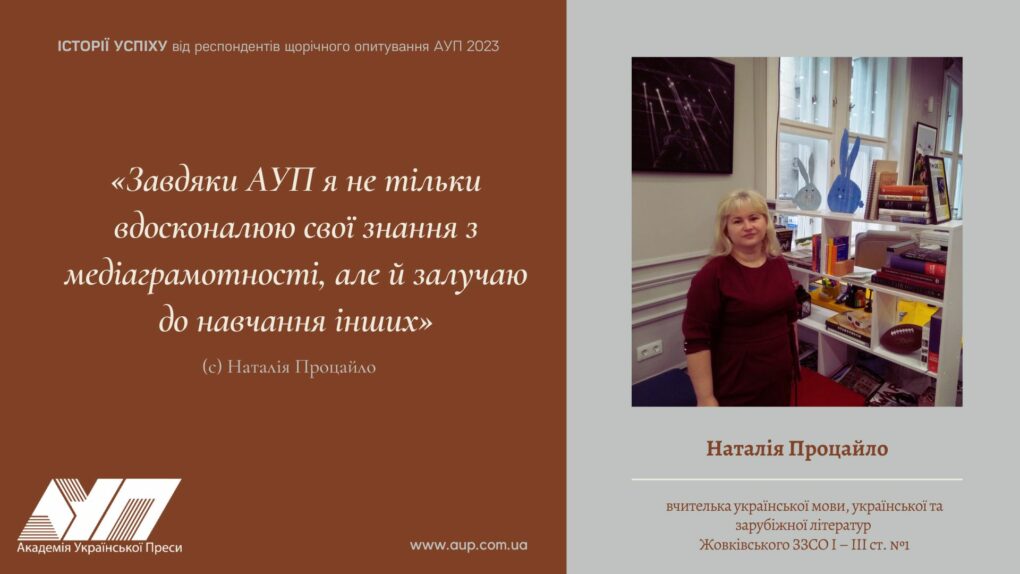
Greetings, dear friends!
We have prepared a short series of stories about how we could be useful to educators in media literacy.
We share these as success stories from respondents to our annual survey.
Today, Associate Professor Natalia Protsailo shares her experience.
Let's get in touch if you are inspired and feel it appropriate to share your story with the AUP. We will share your story on our resources. It is very valuable to receive feedback from dedicated educators. It motivates
______
"Thanks to the AUP, I not only improve my knowledge of media literacy, but also involve others in learning."
(c) Natalia Protsailo
My name is Natalia Protsailo, I teach Ukrainian language, Ukrainian and foreign literature at Zhovkva Secondary School No. 1 in Lviv region. My first acquaintance with the basics of media literacy began in 2014 when I studied at the Lviv Regional Institute of Postgraduate Pedagogical Education. I then learned about the Academy of Ukrainian Press (AUP).
Since then, I have followed the news, competitions, webinars, and ordering literature that AUP sends for free.
I consider my greatest success to be the ability to engage students in media creativity. My students took part in the All-Ukrainian Children's Media Creativity Competition "Children. Media. The World" (2016), and won the "Children and Media" contest (2017). Last year, they created a video "Stereotypes are dream stealers" for the competition "My School is Media Literate" initiated by the AUP.
I encourage research work. In preparation for the regional student conference, the children studied the AUP materials on netiquette published on the Facebook page. Another topic of research was gender stereotypes in Ukrainian speech. Of course, such tasks form students' critical attitude to information, destroy stereotypes that still exist in society, and teach them to be resistant to misinformation.
I integrate the basics of media literacy into the subjects I teach at school. It's nice to see how students, when studying, for example, a writer's biography or working through various texts, can distinguish between fact and opinion, and what can be considered manipulation.
For several years, she has been organizing optional media literacy classes based on the AUP and IREX materials "Learn to Discern: Infomedia Literacy." It was thanks to the AUP that she became a participant in this project.
I also conduct training on media literacy. By the way, I recommend the manual by Tetyana Ivanova and Svitlana Izbash "Be in Trend: MIG to Online". It helped me a lot, and not only for organizing online classes.
Among the materials offered by the AUP, you can find interesting tools, exercises, lessons, and games for different age groups. For example, the game "Adventures of Literatus" teaches how to recognize facts, fakes, and signs of disinformation in an accessible way. Children in grades 5-6 like it very much.
I have published materials on Toolbox under the heading "Media Education in the Context of War."
In general, integrating the basics of media literacy into the subjects of language and literature is one of the main areas of my activity.